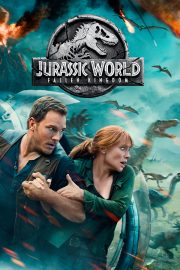Here’s a question for you. At what point do you decide that you like a movie? Or hate it? Within first few minutes, during the intermission or afterwards? The amazing thing about Jurassic World is I know exactly when I started liking this movie.
Till about 4:30 minutes into the movie I was yawning. Two brothers going on a vacation to Jurassic World and no points for guessing how that visit is going end. What else is new? At about 5:30, I was enraged, metaphorically throwing myself on the floor in a metaphoric apoplectic fit. The two brothers are riding in a train that enters the Jurassic World gate, camera glides over one brother’s dirty sneakers while Jurassic Park theme plays in background? Are you kidding me? They could have been eating Pizza or bowling. And the score ends in a panoramic shot of the park which is far from spectacular, it could be any theme park in the world. Why are they wasting a phenomenal John Williams score on such tepid visuals?
I was still fuming as Claire (Bryce Dallas Howard) entered in the next shot. At about 7:30, Clair is giving a tour to prospective investors and she is saying, “No one is impressed by a dinosaur anymore..these days kids look at a Stegosaurus like an elephant from the city zoo.” The penny dropped. This was not just another action packed flick, this was a brilliant satire that was unfolding before me.
As the drama continued, there were more clues to be found in every corner of the frame, so to speak. The kid adds genetic combinations to make a dinosaur on the screen – quite literally, a child’s play. The software guy, Lowery (Jake Johnson) – whose desk is also cluttered – is wearing an original Jurassic Park T-shirt, (in bad taste according to Clair). There are many references to John Hammond – “spared no expense” – throughout the movie. The satire reaches its peak with the helicopter ride of Masrani (Irrfan Khan) and Clair. It ends exactly the same way as did the ride with John Hammond, Dr. Ian Malcolm, Dr. Sattler and Dr. Grant in Jurassic Park. Waterfall enclosed by lush greenery, helicopter descending, John Williams soundtrack. Except that this time, the helicopter lands with a loud bang, the co-pilot gets sick, runs into the bushes and starts puking. (I literally LOL’ed here.) Rarely does one see such biting self-satire.
So what’s really happening under the surface? I like to imagine that it’s Steven Spielberg talking to the select circle of Jurassic Park fans. Fans who were there to witness the birth of CGI revolution brought on by Jurassic Park. The narrative is about how technology has changed cinema over the years. It’s no coincidence that the kid watching slides of early movies showing a T. rex fight gets to watch the same fight in CGI near climax. There is also an element of Spielberg’s own journey. The Mosasaurus that saves everyone in the end has a strong resemblance to the shark in Jaws.
For those of you who were born later, it may be difficult to understand the impact of seeing a live dinosaur on screen for the first time. I remember coming out of the theater feeling dazed, unable to believe what I had just witnessed. Never before did images appear so real, so lively. It was birth of a new era. In the next 20 years, cinema underwent a revolution. Now we can have anything on the screen and make it look plausible. The term ‘special effects’ has lost its meaning. Even a chewing gum ad can have a dinosaur and no one will bat an eyelid. This is what Spielberg is lamenting about (or so I like to think).

Jurassic Park was a special project for Spielberg. Watching the special contents DVD, one is amazed at the painstaking research that went on for three years during the making of this movie. Jurassic World shows the fossils of this work when two brothers stumble into the old visitor’s center. Night-vision goggles or the 1992 Jeep Wrangler Sahara, it’s all there, gathering dust.
In the end the movie relents a bit and you see the T. rex roaring over the empty theme park, to the triumphant major chords in background. No satire here. Except for the concrete and glass buildings, it could have been a T. rex roaring 65 million years ago. As Spielberg explains in the Jurassic Park DVD, T. rex is the star of the movie. He felt that he had to bring it back one last time in the climax. Jurassic World follows this tradition.
Message of this parallel narrative is simple. CGI Dinosaurs have become outdated.
Or as Dr. Ian Malcolm would quip, “Don’t you mean extinct?”



